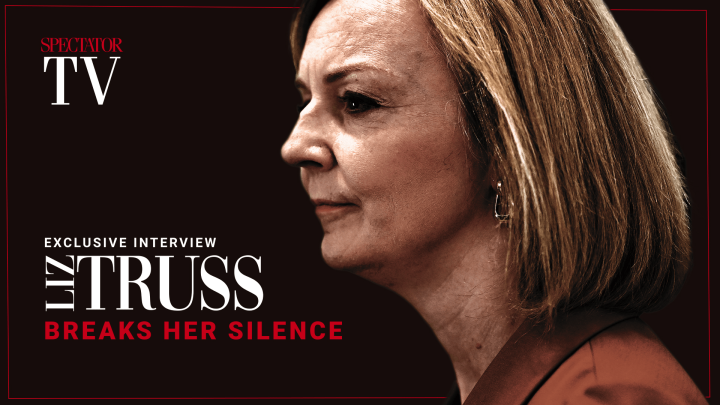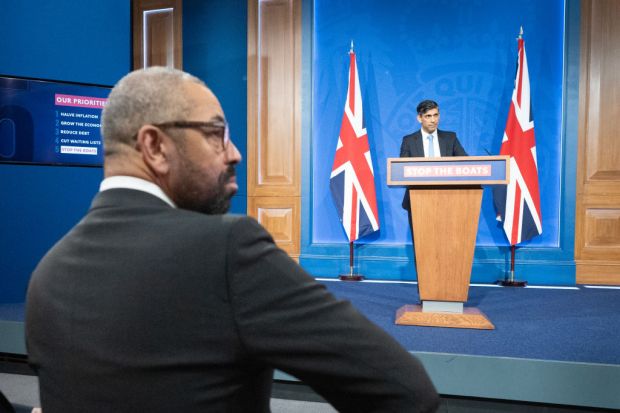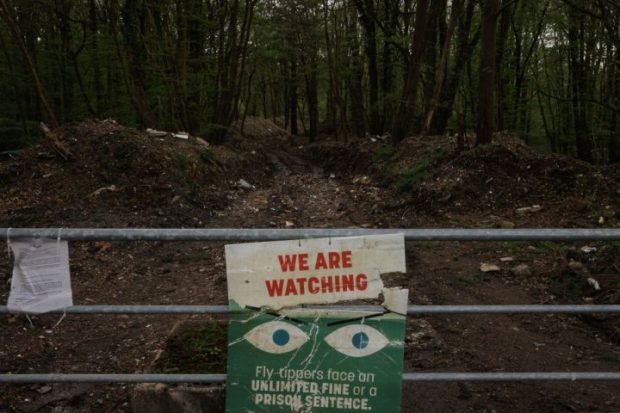What went wrong for Liz Truss? In her first interview since leaving 10 Downing Street she talks to Spectator TV (watch it here), going through her leadership election, her 49-day premiership and her plans for the future. She says her plans to scrap Rishi Sunak’s corporation tax rise failed because the OBR rejected her analysis that ‘raising taxes is counter-productive’ and is ‘not actually going to lead to reducing debt’. The OBR, she says, should face greater scrutiny about the assumptions in its models given how much sway she believes they now hold over UK economic policy.
Truss admits to some mistakes and says she might not have launched her mini-Budget had she known about the ‘tinderbox’ of LDI pension liabilities: the biggest single factor, she says, in the market wobbles that brought down her premiership. She says she was never told about the LDI risk and indeed ‘didn’t know the existence of LDIs, which turned out to be the main problem’. Her chancellor, she says, ‘wasn’t informed of this either’. Had they been, she says, she would have delayed the mini-Budget.
When ‘senior officials’ told her to abandon her economic agenda, she fired her chancellor: her premiership, she says, was probably doomed from that point (‘Looking back, from where we’re sitting now, I can see that’). Her objective now, she says, is to return to the political fray and lead the case for a low-tax, higher-growth economy. ‘There aren’t enough people making the case, full stop. And I believe that I’ve learnt a lot in my time in government, I understand what some of the pitfalls are, I’ve been through the mill on this and we do need to do things differently.’
You can watch the full interview using the link above. But here are the key quotes:
- On firing Kwasi Kwarteng.
‘I was getting some very serious warnings from senior officials that there could be a potential market meltdown the following week if I didn’t take action. […] I weighed it up in my mind about whether I needed to do that. But the reality was I couldn’t, in all conscience, risk that situation.’
‘Your Chancellor was doing what you asked him. When he goes, doesn’t your authority go with him?’
‘Well yes, and I think that was probably the case. Obviously, looking back, from where we’re sitting now, I can see that. At the time, I was just thinking: ‘How do I make sure there’s not a market meltdown?’ So I wasn’t really focused on my long-term future…. I count Kwasi as a friend and what happened: it was a difficult decision. Was it the right decision? It’s very hard to tell.’
- Truss says neither she nor Kwarteng were informed about the pension fund ‘tinderbox’. If she had been, the mini-Budget may never have taken place.
‘Of course, this is really a matter for the Chancellor rather than the Prime Minister. But my understanding was that he wasn’t informed of this either…People said, “why aren’t you communicating?” But the fact is we didn’t know about the issue! We didn’t necessarily understand the issue, and that is a difficult position to be in as PM and Chancellor.’
- How OBR forecasts drove the corporation tax rise. Truss disputes that raising corporation tax would have raised the £20.2 billion the OBR expects: she thinks the deterrent effect on growth would undermine any extra revenue raised: the so-called ‘dynamic’ effect. People talk about her deficit-funded tax cuts, she said.
But ‘what we were talking about on corporation tax is not raising corporation tax. The problem is that because we don’t have, in my view, sufficiently dynamic forecasting, the prediction was that that would cost money. It was the direct relationship of the OBR forecast with the market that’s the issue, and the prevailing orthodoxy which is that raising taxes increases revenue… Now my view is that raising taxes is counter-productive. It’s not actually going to lead to reducing debt in five years’ time. But my view is not shared by this broader orthodoxy, that’s the issue.’
- It’s time for the OBR to explain its model.
‘It is exactly the question I think should be able to be asked. What are these assumptions based on? If you’re looking at tax cuts, that you think might lead to growth or supply side reforms, why are those assumptions being made? And my view … is that the way the model works, which is essentially a pretty static model … mitigates against those kinds of measures.’
- Scrapping the 45p tax rate perhaps ‘was a bridge too far’.
‘Well we could all think different things with hindsight, and perhaps it was a bridge too far, but I’m not convinced that it was a magic bullet, that everything would have been fine if we hadn’t done that, because I thought it was quite significant that after there were more market wobbles and we reversed the 45p tax decision relatively soon, we were essentially forced to reverse the position on corporation tax. So although, maybe it was a step too far, who knows? This is my point about counterfactuals. It’s easy to say, ‘I still believe it’s the right thing to do for Britain’. During the vast majority of the Labour government we had a 40p top tax rate.’
- On why she is the person to lead the argument now for the growth agenda.
‘Nobody would be more delighted than me, Katy, if there were lots of other people coming forward and making these arguments. I would be more than delighted to have other people go out there and make the case. But the fact is there aren’t enough people making the case, full stop. And I believe that I’ve learnt a lot in my time in government, I understand what some of the pitfalls are, I’ve been through the mill on this.’
- Given what happened, does she regret going for Prime Minister?
‘No, I don’t regret it’.
‘And would you want to be Prime Minister again?’
‘No.’
‘I thought you were a never say never sort of person.’
‘I definitely want to be part of promoting a pro-growth agenda. I definitely want to carry on as an MP. I’m positive about the future of Britain and I’m positive about the future of the Conservative party. I think we need to start building more of a strong intellectual base. But I’m not desperate to get back into Number 10, no.’
- She says she was surprised to have Joe Biden passing comment on her tax policies – as part of international criticism.
‘I think it reflects a drift, right across the free world, towards what are essentially more socially democratic policies: higher taxes, higher spending, bigger government, relatively low interest rates and cheap money. There’s no doubt that those of us on the side of politics who believe in smaller government and free markets have not been winning the argument. That’s the other thing I would say. Alongside the specific issues around the LDIs, alongside the communications issues we had: also, the weather has changed. What I found trying to make those arguments – that low taxes are a good thing, that they will help attract investment into Britain, that that will drive economic growth and that economic growth will benefit everybody – those arguments didn’t fall on particularly fertile ground.’
Got something to add? Join the discussion and comment below.
Get 10 issues for just $10
Subscribe to The Spectator Australia today for the next 10 magazine issues, plus full online access, for just $10.




















Comments
Don't miss out
Join the conversation with other Spectator Australia readers. Subscribe to leave a comment.
SUBSCRIBEAlready a subscriber? Log in